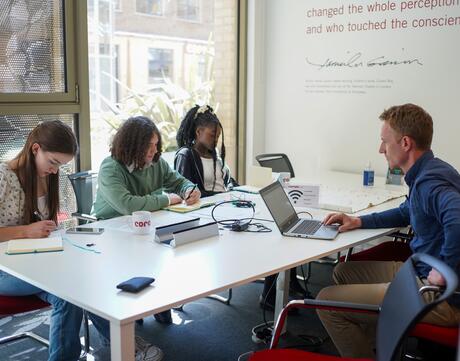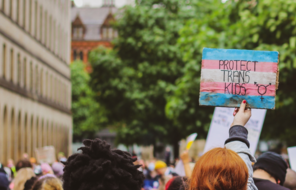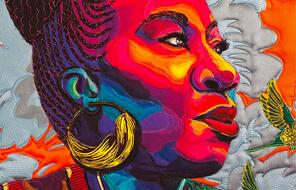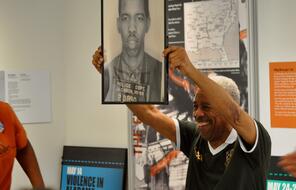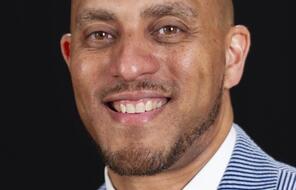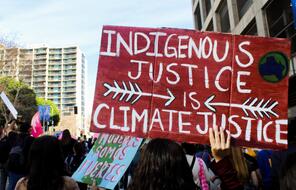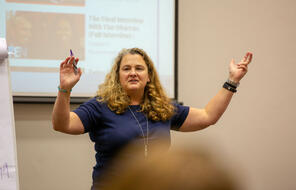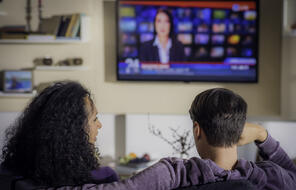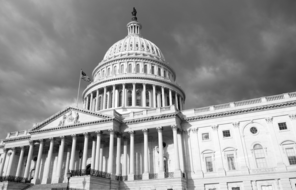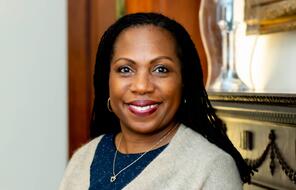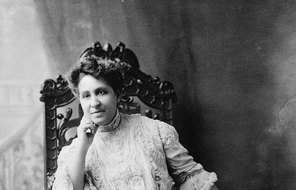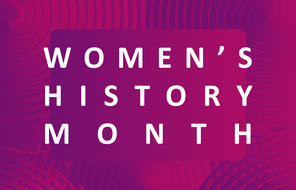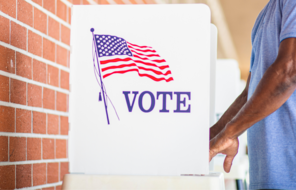On 21st June 2024, we were delighted to celebrate twenty years of Facing History in the United Kingdom with our longtime community members, teachers and students. The day was jam-packed with talks and discussions from industry experts, students and teachers on topics that addressed how we can build empathy and trust within an increasingly polarised society.
The event began with a keynote address from author and consultant Jon Alexander, who talked about his vision of a citizen-led society. This was followed by a series of breakout sessions across a range of topics such as democracy and media literacy, and the afternoon ended with a student panel. Click here to read a full run-down of the day.
One of the highlights of the event was the involvement of two Facing History students, Toby and Sarah, who as part of their work experience supported the event as Student Reporters. The students had the opportunity to gain experience in a content creation role; interviewing attendees and speakers, taking photos, noting down quotes, editing videos, collecting photo permissions and more. Check out our Instagram here to preview some of the amazing content they collected. As part of the experience, they also had the opportunity to write a blog on a topic of their choice, and both students decided to write a blog focusing on a specific breakout session.
Students prepare their interview questions before the event
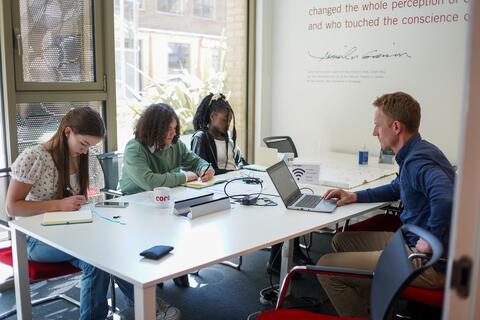
Students prepare their interview questions before the event
Toby reporting on Developing Media Literacy Skills to Safeguard Our Society
Student reporter Toby
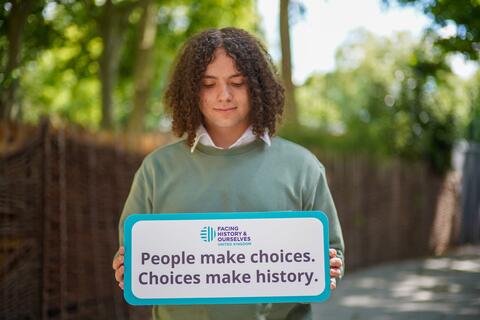
Student reporter Toby
Recently, I was lucky to be able to participate in the event, We Are Facing History: Change Starts with Us as a reporter on all the happenings throughout the event. One of the talks I got to sit in on was Annabel Gillard and Drew Benvie’s discussion about media literacy in the ever-changing online environment. With Annabel’s speciality in AI ethics and Drew’s professional experience in a social media consultancy, they brought two very separate perspectives together, which gave way to some very interesting discussion.
From the coordination of dangerous political events such as the 6th January 2023 attack on the US Capitol, and the rise of creators that appeal to the insecurities of struggling individuals, such as Andrew Tate, there is obviously an issue with our online engagement and the algorithms behind it. These algorithms are cleverly designed to keep individuals on websites for the longest amount of time, which most often is through content that engenders a negative emotional response and keeps individuals engaged, known as “rage-baiting”. It is tricky for users to resist this, as the reason it is so effective is because it manipulates our biological instincts to the betterment of the creator or website, rather than our own betterment.
Guests attend a breakout session
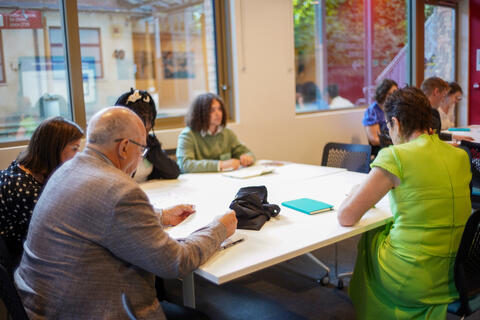
Guests attend a breakout session
From the talk, it was clear that what we must do as citizens is to hold the businesses profiting off of “rage-bait” and misinformation to account, but there is definitely disagreement on how this can be done.
On one hand, we can allow the government to step in, helping regulate negative and untrue content online or requiring ID to be given in order to make an account online. This also presents issues, as many are wary about practices that undermine free speech and removing anonymity can lead to those who feel they need it, such as members of the LGBTQ+ community, feeling unsafe speaking out online.
At the same time, an approach that involves us as individuals changing our habits would be difficult to organise and would be hard to commit to. It would require so many across the world to go against their own instincts that cause them to rise to misinformation and “rage-bait” in order for the workings of the algorithm to be changed.
The answer may be a mix, where citizens are able to create an effective dialogue with the government and with their communities about the dangers of online communication. In the meantime, Drew gave us some good advice; that we should educate ourselves on how the internet works and cultivate our algorithms so that they provide reliable, useful content to us.
I’d like to thank both of the speakers; Drew and Annabel, as well as the moderator of the discussion, Aneira Roose-McClew, who, together, crafted a very thought-provoking conversation about such a pressing issue for all of us.
Sarah reporting on Standing Up Against Racial and Religious Hatred
Student reporter Sarah
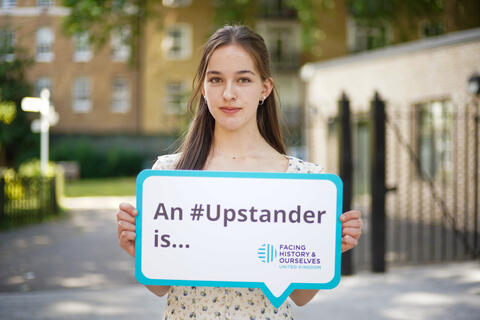
Student reporter Sarah
The Standing Up Against Racial and Religious Hatred session invited three talented speakers, Miriam Tomusk, Rachel Cohen and Zahed Amanullah, to deliver their expertise on topics surrounding racial and religious hatred and offer pragmatic solutions to lessening the damaging impact that such divides cause.
The session opened with Miriam, Programme Manager for Solutions Not Sides, describing how their educational programme aims to facilitate open, tolerant discussions surrounding the Israel-Palestine conflict in schools and colleges. She emphasised the indispensable nature of their work in a time where young students are exposed to an indeterminable mix of true and fake news about the war through social media, which can stimulate polarisation and shut down open communication between ‘sides’.
Next, Rachel, from the Faith and Belief Forum, outlined how the ongoing conflict in Israel has impactfully penetrated spaces that it wouldn’t have done so before, such as workspaces where company staff experience bitter clashes over opposing perspectives when there isn’t adequate infrastructure in place to handle these disputes. She highlighted how students who feel personally invested in the events due to their religion can consequently feel distressed and acutely targeted by unmediated discourses or arguments about the topic. Her work as Programme Lead for Youth and Universities at The Faith and Belief Forum provides schools with interfaith leadership programmes that aim to develop young people’s confidence and ability in navigating sensitive dialogues whilst encouraging receptiveness to alternate views strictly accompanied by respect and toleration.
Lastly, Zahed, from the Institute for Strategic Dialogue, provoked the audience to think critically about what our understanding of ‘hate’ looks like and how to recognise it. He spoke about why professional institutions require greater capacity for objective workplace education over current polemic issues as a means to reduce the fomentation of aggression and hatred that can arise due to difference in beliefs. He explored how the lack of ability to recognise how hatred can manifest in professional spaces partially owes to the fact that there are ‘few people who can objectively address the war’, which can allow the illusion of the matter being a binary one to arise. Using his research from the Institute for Strategic Dialogue, he noted how the ‘Whitewashing’ of the account of the ‘other side’ is all too often observed in the polarised dialogue wherein Islamophobia and antisemitism are then given space to fester.
Endowing the audience with a strongly hopeful attitude, the session provided a careful observation of the origins of racial and religious hatred whilst drawing attention to practical solutions that can be implemented to combat this.



